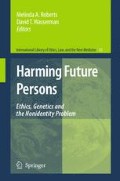Abstract
This paper argues that agents’ intentions can play a critical role in the moral appraisal of policies that result in the creation of shorter or harder lives than the lives that would have resulted from other policies. When agents, whether parents or policymakers, intend to create people whom they believe can only lead shorter or harder lives than others they might have created, the people they create will lack a complaint against them—a complaint they might have had if the agents lacked those intentions.
Access this chapter
Tax calculation will be finalised at checkout
Purchases are for personal use only
Preview
Unable to display preview. Download preview PDF.
References
Asch, A. and D. Wasserman. 2005. Where is the sin in synecdoche? In Quality of life and human difference: Genetic testing, health care, and disability, eds. D. Wasserman, J. Bickenbach, and R. Wachbroit. New York: Cambridge University Press.
Brock, D. 1995. The non-identity problem and genetic harms: The case of wrongful handicaps. Bioethics 9: 269.
Feinberg, J. 1986. Wrongful life and the counterfactual element in harming. Social Policy and Philosophy 4: 145–78.
Glover, J. 1992. Future people, disability, and screening. In Justice between age groups and generations, eds. P. Laslett and J. Fishkin. New Haven: Yale University Press 127–43.
Hanser, M. 1990. Harming future people. Philosophy and Public Affairs 19: 47–70.
Harman, E. 2004. Can we harm and benefit in creating? Philosophical Perspectives 18: 89–113.
Lillehammer, H. 2009. Reproduction, partiality, and the non-identity problem. In this collection.
McMahan, J. 1998. Wrongful life: Paradoxes in the morality of causing people to exist. In Rational commitment and social justice: Essays for Gregory Kavka, eds. J. Coleman and C. Morris. Cambridge: Cambridge University Press.
McMahan, J. 2009. Asymmetries in the morality of causing people to exist. In this collection.
Parfit, D. 1984. Reasons and persons. Oxford: Clarendon Press.
Peters, Jr., P. 2004. How safe is safe enough? Obligations to the children of reproductive technology. New York: Oxford University Press.
Roberts, M. 2007. The non-identity fallacy: Harm, probability and another look at Parfit’s depletion example. Utilitas 19: 267–311.
Shiffrin, S. 1999. Wrongful life, procreative responsibility, and the significance of harm. Legal Theory 5(2): 117–148.
Steinbock, B., and R. McClamrock. 1994. When is birth unfair to the child? Hastings Center Report 24: 15–21.
Tooley, M. 1998. Value, obligation, and the asymmetry question. Bioethics 12: 111–124.
Wasserman, D. 2005. The nonidentity problem, disability, and the role morality of prospective parents. Ethics 116: 132–52.
Woodward, J. 1986. The non-identity problem. Ethics 96: 804–31.
Author information
Authors and Affiliations
Corresponding author
Editor information
Editors and Affiliations
Rights and permissions
Copyright information
© 2009 Springer Science+Business Media B.V.
About this chapter
Cite this chapter
Wasserman, D.T. (2009). Harms to Future People and Procreative Intentions. In: Roberts, M.A., Wasserman, D.T. (eds) Harming Future Persons. International Library of Ethics, Law, and the New Medicine, vol 35. Springer, Dordrecht. https://doi.org/10.1007/978-1-4020-5697-0_13
Download citation
DOI: https://doi.org/10.1007/978-1-4020-5697-0_13
Publisher Name: Springer, Dordrecht
Print ISBN: 978-1-4020-5696-3
Online ISBN: 978-1-4020-5697-0
eBook Packages: Humanities, Social Sciences and LawPhilosophy and Religion (R0)

